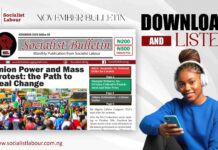After poorly managed elections and a result that is disappointing for many, we need to continue the struggle where the working class is strongest: work place / trade unions. Elections are important, but they are dominated by money and coverage in the mass media, including television, radio and the newspapers. These are all owned by the rich elite. This makes it difficult for the socialist voice to be heard. In contrast, it is the working class who are members of the trade unions. When they are organised effectively we have massive collective power and we can overturn the unpopular policies of any government.
As a minimum we need to campaign for a re-run in all polling units with problems, but also crucially we need pressure from the trade unions to address the key economic constraints that we all face.
As Socialist Labour said before the elections:
The next president will attempt to impose higher fuel prices, higher inflation, unemployment rates, taxes, school fees, and electric tariffs. The Government will continue strive to impose its “No work No pay” policy and postpone any increase in the minimum wage. We need to struggle against these attacks in order to survive.
We face a series of continued attacks. We need to unite and encourage the new leadership of the Nigeria Labour Congress (NLC) and the Trades Union Congress (TUC) to lead action and to provide effective solidarity action where workers take action.
Now, more than ever, we need an active trade union movement to enable the mass of labouring people to protect themselves from the currency crisis, fuel price increases and to campaign for an increased minimum wage.
We all face hardship and frustrations with the continuing currency crisis. This is particularly the case for those working in the informal sector who do not have bank accounts. This crisis could be ended in a few days if the old N1,000 and N500 notes were made legal tender until the end of the year and were to be re-issued by the Central Bank (as ordered by the Supreme Court).
This crisis came after months of fuel shortages when prices rose to at least twice the previous official price of N165. This led to huge increases in the cost of transport so that many of us can now hardly afford to travel to work. We need the official price of fuel to be enforced and for the NNPC Ltd to maintain adequate supplies of fuel.
These issues have compounded the rate of inflation, officially at above 20%, but many prices like those for kerosene, gas, bread etc have doubled over the last year or so. The minimum wage was last increased nearly for years ago. Over this period the costs we face have at least doubled.
Oxfam says that by international standards the minimum wage in Nigeria should be at least N100,000 and then increased every year by a cost of living allowance to mitigate the impact of inflation and currency devaluation. The International Labour Office (ILO) says most countries increase their minimum wage every year, especially when inflation is high.
The Federal and state governments have plenty of money as their FAAC oil money allocations last year were the highest since 2013. And yet many states did not pay their salaries and pensions on time. What will happen in the coming years when crude oil income is expected to fall? Only firm trade union action can prevent our further suffering.
The Election, Some Thoughts
The general elections, so far, leave much to be desired. Elections are a do-or-die affair because of the rich pickings on offer to the occupants of political office.
The APC mainly switched from vote buying (because of the currency restrictions) to allegations of changing the results and buying off INEC Officials. The BVAS were widely compromised and by Sunday evening, INEC had only published the results for Ekiti State. This was despite their website not showing the full details for this state and indicating that the results for the state were not complete.
Yiaga Africa said that in only two thirds of polling units, the Presiding Officer attempted to transmit/send the polling unit result image to the INEC’s online database (IReV). So the electronic voting system failed widely or was not used properly.
There are also allegations of electronic transfer of funds to compromise some voters. Votes were also allegedly bought by buying materials and paying communities collectively through one bank account.
Thugs were used, as usual, to snatch ballot boxes, destroy results and/or stop voting at polling units where Labour Party did well or stopping certain ethnic groups from voting. However, the violence on election day was probably less than at many other elections.
We welcome the active participation of youths, particularly student youths and the courage shown in resisting political thugs and disenfranchisement. This included, for example, mass protests in Yenagoa that won the re-run of the election there on Sunday.
We emphasise the need to avoid ethnic based violence. We should not fight amongst ourselves over who amongst the corrupt elite will loot for the next four years.
INEC must re-conduct elections where there were disruptions by political thugs and where INEC officials failed to show up. That’s fair play, no voter should be disenfranchised.
Despite the Labour Party winning in Lagos State, we need to ensure that the elections are re-run in all polling units where free and fair elections were not held.
Whoever is eventually declared the winner of the presidential elections we need to demand action from the NLC to force the government to solve the currency crisis, control the price of fuel and fast track another increase in the minimum wage.





